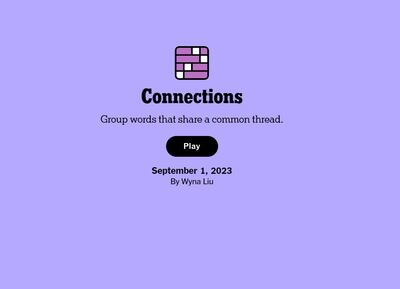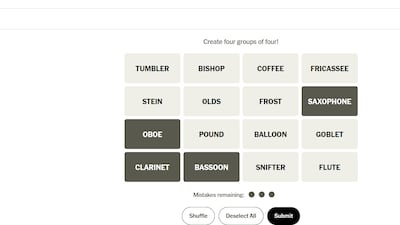Cast your mind back a year to when the seemingly simple word game Wordle exploded in popularity. Taking over puzzle pop culture, the rise of the game led millions on social media to share – and boast – about how quickly they could guess the word.
Now puzzle fans have a new word game to scratch their heads over.
Created by the New York Times and launched this week, Connections is different from its predecessor because, rather than players having to guess one word, they have to group words together.
How to play Connections

“Group words that share a common thread,” states the game’s opening page, inviting players to try to solve what the New York Times calls “a unique puzzle challenge that tests players’ wit, vocabulary and creativity".
Players are given 16 words. They have to identify the relationships between those words before arranging them into four groups, with only four attempts allowed in each game.
There are four difficulty levels. Yellow is the easiest, green and blue are intermediate, and purple is the hardest.
As an example, one group might contain the words bass, flounder, salmon and trout, which would all be put together as fish.
Alternatively, the words ant, drill, island and opal would be grouped together because they can all use the prefix fire.
Players are warned to watch out for words that could belong to several categories before they start assembling their groups.
According to the New York Times, which also owns Wordle after buying it from creator Josh Wardle for $1 million, Connections is “the most successful launch of any game we’ve developed in-house since the Mini Crossword in 2014".
“Each day reveals a clever, thoughtful, relevant, human-made puzzle that tries to trick you, and makes the challenge of solving it extremely rewarding,” said Jonathan Knight, heads of games at the newspaper.
The next Wordle?
The game, which is available to play on a desktop, mobile and soon on the newspaper’s app, is the latest word puzzle to test players' skills.
Wordle kickstarted the trend, going viral and quickly inspiring a slew of spin-offs, including Nerdle, Dordle and Globle.
Wordle was created in May 2018, but it was not until early 2022 that it exploded in popularity when Wardle made it public, after years playing the game privately with his friends.
Within weeks, famous figures including Bill Gates, Queen Camilla and Kamala Harris were raving about Wordle, with the US Vice President revealing she devised strategies to try to complete the game.
Queen Camilla told British Vogue that she played Wordle every day with her granddaughter. "It’s all very satisfactory when it tells you how brilliant you are," she said.
Oscar-winning actor Ben Affleck revealed that he was in a “fiercely competitive” Wordle group with fellow A-listers Matt Damon, Jason Bateman and Bradley Cooper.
“So, there’s Octordle, which is the eight words, and then Quordle, which is the four words, and then Wordle, which is the one,” Damon said. “We play all three and you add up your score. It’s very, very competitive.”

